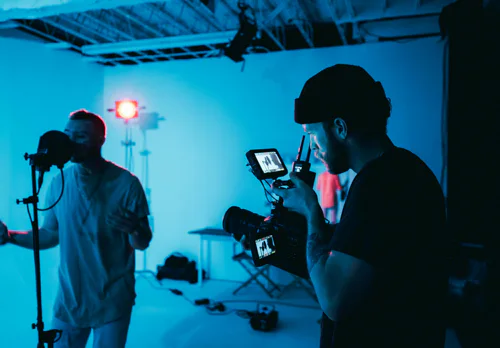What qualities should a bit player have?
Like extras and background actors, bit-part actors can be very different in type. Whether a child with an Asian background or a teenager with braces, a pierced student, a sturdy housewife, a sporty pensioner, an English-speaking businessman or a muscular craftsman - "Everyone is needed at some point." Everyone is unique and wonderful in their own way and is sought after by film, television, theater, advertising and the music industry in the "People" category.
If you also have unusual hobbies and talents, e.g. singing, dancing, unicycling or stand-up comedy, you are a suitable candidate for specific formats and thus increase your chances of further engagements.
However, a bit-part actor should fulfill the following requirements. Firstly, they should already have some acting experience from previous extras jobs or acting lessons, as well as a certain amount of acting talent. This is because bit-part actors are given an individual role that they have to think their way into and portray authentically. It should also be no problem for them to memorize texts and reproduce them flawlessly at the touch of a button.
Patience is probably the most important skill for a small actor. They should familiarize themselves with this early on. Shooting days for film or television can be long, up to 24 hours, and most of the time is spent waiting in the recreation room, sipping what feels like a thousand coffees, chatting with colleagues, reading or doing other things to pass the time. Even in theaters, musicals or operas, rehearsal days and performances can drag on - only to be used for 5 minutes and a few lines of text. But just the fact that you share a stage with the stars, can be seen in a set with them and can experience the magical atmosphere on location is worth the effort.
You should also exercise patience during the agency process. You may not get a job at the first attempt.
What vocational training is required?
No special training is required to become a bit-part actor. As mentioned above, however, bit-part actors do need some stage or camera experience, because a bit-part speaking role is only given to someone who does not simply recite a text - even if it is only one sentence long - by heart and without mistakes, but conveys emotions and expresses and moves correctly.
You can gain this kind of experience either by working as an extra or small actor on stage or on a film set or by taking part in acting workshops or acting classes. However, before you sign up for a course, make sure that the acting teacher is not a pretender but has sufficient know-how. If you are not sure, ask family, friends and acquaintances for recommendations.
There are several ways to get suitable extras or bit parts jobs as quickly as possible. Television stations do not usually produce their formats themselves and commission either their own or independent production companies. These then develop finished feature films, soaps and shows. Either they also take care of the casting of small actors or they commission external agencies that are familiar with the placement of actors. Most agencies can be found in the dominant media cities such as Cologne, Berlin, Hamburg and Munich, as demand is very high there. Their card indexes and databases contain several thousand artists, so that they can draw from a broad contingent and find the right candidate for the role they are looking for. It therefore makes perfect sense to apply for jobs through agencies as well as to introduce yourself directly to production companies.
Job portals or job exchanges that specialize in artistic professions are another way of finding out about current job vacancies. You can register with some of them, create a profile and use it to apply directly to the client. You will find out more about this in the following sections.
In addition to production companies, agencies and job portals, universities should not be ignored when looking for jobs. This is because film academies and drama schools are always looking for actors to join their roster and support them in their productions. This is an excellent opportunity to gain further experience and develop, especially for small actors who want to achieve greater things. However, there is one catch: student projects are often "no budget" productions. However, the performer usually receives a copy after completion, which is worth its weight in gold for their showreel or demo tape. This serves as a good reference and can be attached to the documents for the next application.
How do I convince people in the application process for a first job?
Of course, your convincing and flawless application is what counts in the first instance.
Production companies either cast small actors themselves or commission external agencies that have experience in casting people. Berlin, Cologne, Munich and Hamburg are the casting and filming locations par excellence. It is best to live close to these cities so that you can take part in castings at short notice, as jobs are not always advertised well in advance.
Applicants then have to prove their skills at mass or individual castings. Have your sedcard and other documents ready and go into the audition with confidence. You should know your role in your sleep. If no role description or text has been announced in advance, prepare yourself for an improv acting session. Also be aware that you will probably have to show off your other talents if you have listed them in your application. If you are well prepared, nothing can happen to you except a rejection - and in this industry you will experience this more often than you would like. However, don't get discouraged and stay on the ball!























